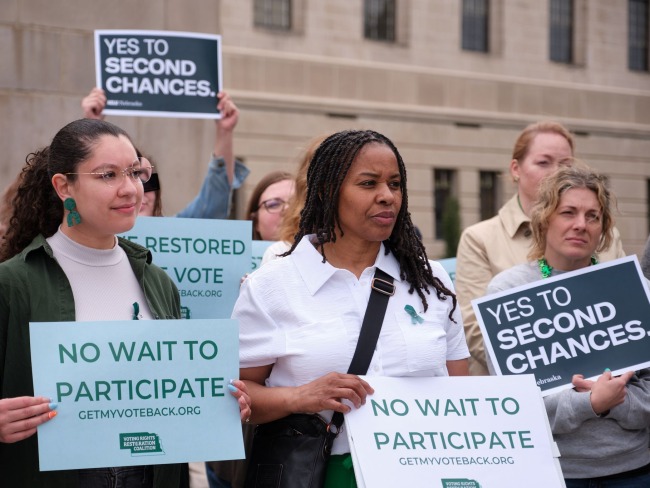The Ballot Bulletin: Expanding the Vote in Nebraska, Colorado, and more!
Learn how The Sentencing Project works with coalitions across the country to expand voting rights for people impacted by the criminal legal system.
Related to: Voting Rights

This Second Chance Month state advocates and researchers from North Carolina to Colorado worked to guarantee voting rights for persons completing their sentence inside and outside of prison and jail and for persons post-sentence. Nationally, more than 4.4 million persons are disenfranchised from voting due to a felony conviction.
Expanding the Vote in Nebraska
In April, state lawmakers approved LB 20 which ends the two-year waiting period for more than 7,000 Nebraskans who could not vote directly after the completion of their sentence. The measure, championed for years by Omaha state Sen. Justin Wayne, passed by a wide margin in the last year of Wayne’s final term. The Sentencing Project joined Nebraska lawmakers and advocates more than seven years ago to call attention to over 17,000 residents disenfranchised from voting due to a felony conviction including those completing their sentence in prison and jail, community supervision, and persons post-sentence. LB 20 goes into effect in July.
As a national partner to Nebraska’s Voting Rights Restoration Coalition, The Sentencing Project organized a national sign-on letter, participated in weekly strategy calls, and worked with local partners to expand the vote. We are working to nationalize the win in Nebraska to continue the momentum by convening regular calls with state and local partners to strategize on ways to advance rights restoration. On those calls, Nebraska advocacy organizers shared tactics and strategies on getting LB 20 to the finish line with state advocates from California, Colorado, Kentucky, and other states.
Guaranteeing the Vote for Incarcerated Voters
The Colorado Criminal Reform Justice Coalition (CCRJC) is working with coalition partners inside and outside the legislature to push forward a bill that would expand in-person voting to every jail in the state. The coalition has worked closely with the Secretary of State’s office to pilot a powerful and productive partnership in two Denver jails and is now looking to scale up and ensure that every eligible, incarcerated voter can cast a ballot.
During The Sentencing Project’s regular jail-based voting calls, coalitions from Colorado, Washington D.C., Michigan, Massachusetts, Illinois, and other jurisdictions have shared best practices and challenges about their jail-based voting programs to the group of over 50 jail-based voting advocates.
Research and Advocacy to Expand the Franchise
Academics and advocates are increasingly using data and research to advance voting rights campaigns and increase civic participation amongst people with felony convictions. Research teams at universities — and those embedded in community organizations — have undertaken studies in recent years on what messages and practices successfully mobilize justice-impacted communities in states including New Jersey, North Carolina, Minnesota, and Texas.
Building off a panel at last summer’s Civic Power conference, The Sentencing Project co-organized a webinar with Initiate Justice, Grassroots Leadership, and Forward Justice. The panel included formerly incarcerated leaders, advocates, and academics discussing how they are using data and research to advance voting rights campaigns. The discussion explored how data shows effective ways to engage justice-impacted communities, emerging areas of research, and how research campaigns have enhanced community organizing and advocacy efforts. You can view the webinar here.
Other News
- California: More than 97,000 Californians cannot vote while serving a prison term for a felony conviction in California, according to our new state brief. California’s disenfranchisement rate ranks second highest in the region, and eligible Black Californians are ten times as likely as whites to lose their right to vote due to serving a prison sentence for a felony conviction. Other state briefs can be found here.
- Maryland: The State Senate failed to pass a bill that would have guaranteed access to voter registration and the ballot for justice-impacted residents by expanding automatic voter registration policies to include the Department of Public Safety and Correctional Services (DPSCS), which manages all state correctional facilities (HB 627). The bill passed the House with overwhelming support in March.
- New Mexico: Justin Allen, Inclusive Democracy Organizer with OLÉ, authored a new commentary, Civic engagement – for all – is good for New Mexico, discussing his effort to register to vote following the 2023 passage of New Mexico’s Voting Rights Act which included a provision restoring voting rights to over 11,000 eligible New Mexicans.
- North Carolina: A federal judge ruled a law was unconstitutional that made it a serious crime for someone to vote while still on probation or parole for a felony conviction when they had simply violated the voting law by mistake. The summary judgment can be appealed.
- Tennessee: According to the Campaign Legal Center a federal judge struck a blow against the state’s felony disenfranchisement regime, ruling that Tennessee election officials cannot wrongly deny Tennesseans with past felony convictions their freedom to vote if they are eligible and the state must fully inform eligible voters of their eligibility.
- National: The Sentencing Project joined the National Voting in Prison Coalition and sent a letter signed by 44 state and national groups to Congressional House Members seeking co-sponsorship of the Inclusive Democracy Act. The Inclusive Democracy Act would allow all eligible residents with felony convictions to vote in Federal elections.



